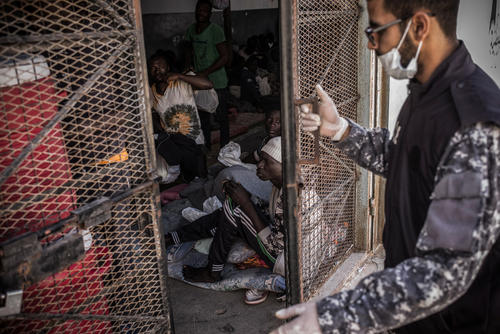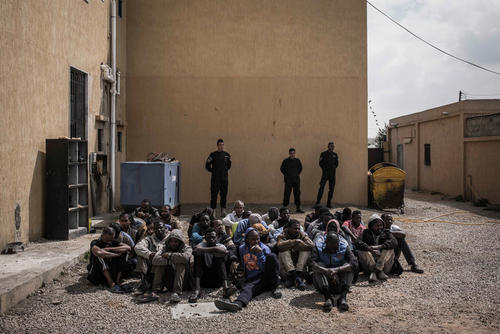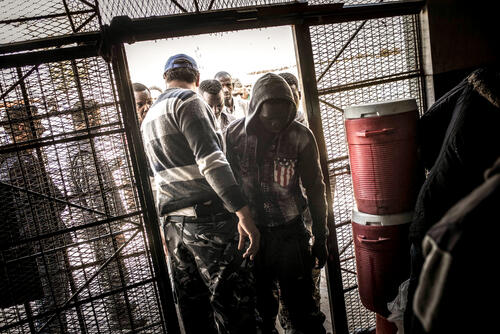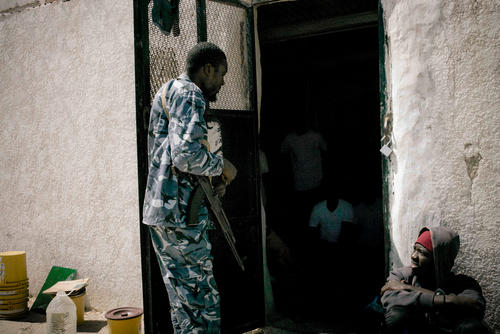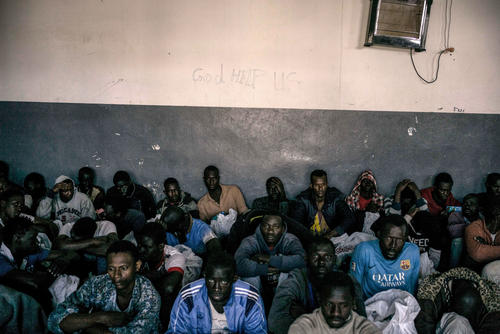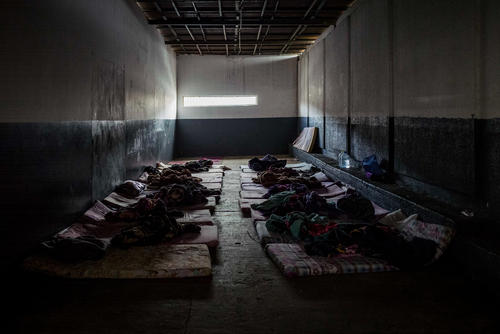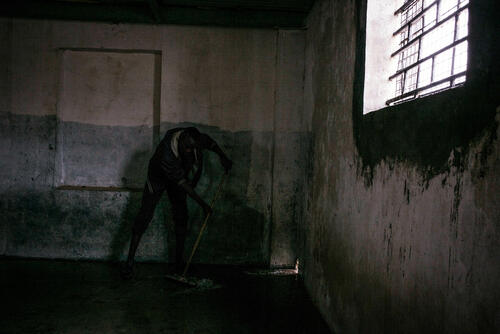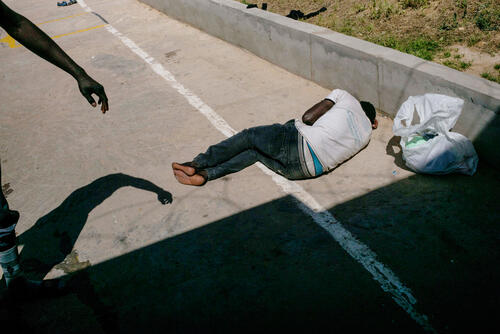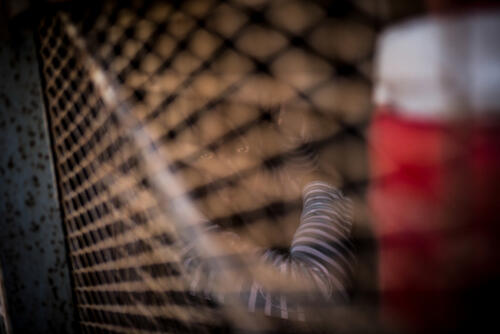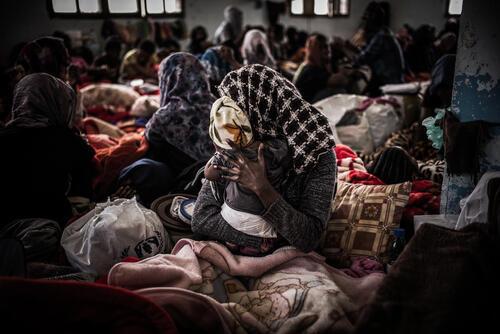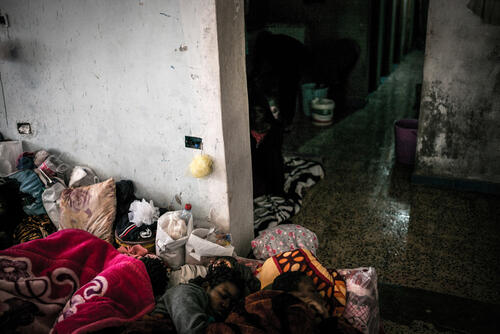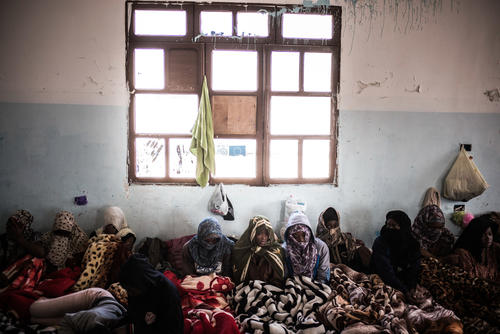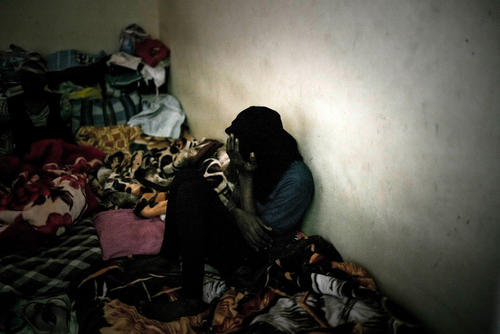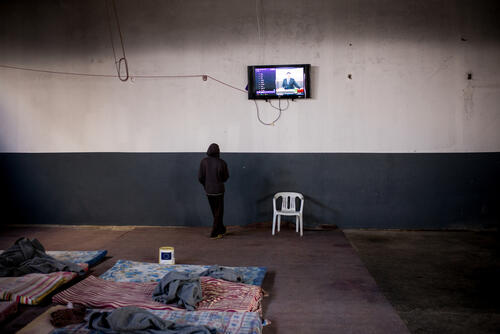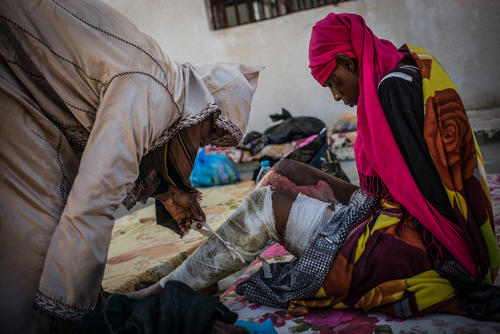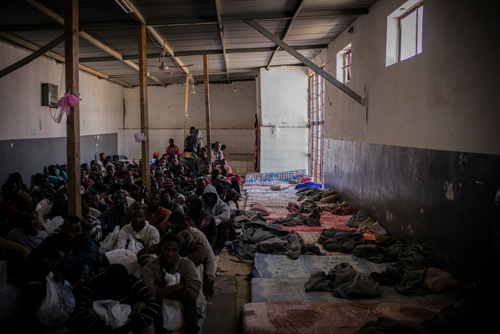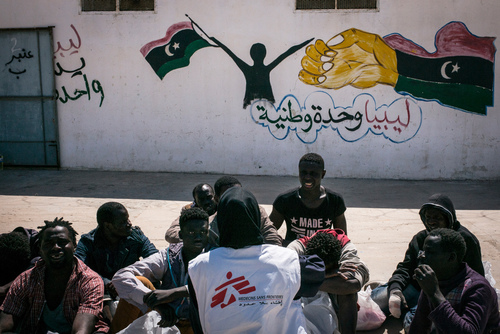End arbitrary detention of refugees and migrants in Libya
For more than a year, Médecins Sans Frontières (MSF) has been providing medical care to refugees, asylum-seekers and migrants held inside Tripoli detention centres in conditions that are neither humane nor dignified.
Detainees are stripped of any human dignity, suffer ill-treatment and lack access to medical care. Detention is causing harm and unnecessary suffering. It is directly linked to the majority of the physical and mental health problems for which detainees require medical attention. People are held arbitrarily with no way to challenge the legality of their detention, virtually no access to consular services or to the outside world.
With no rule of law in Libya, the detention system is harmful and exploitative. There is a disturbing lack of oversight and regulation. With no formal registration or proper record-keeping in place, once people are inside a detention centre there is no way to track what happens to them. Some people are held for prolonged periods of time; others are transferred between different detention centres, moved to undisclosed locations or disappear overnight.
MSF witnesses on a daily basis how much unnecessary harm is being caused by detaining people in these conditions. There is only so much medical teams can do to ease the suffering.
MSF calls for an end to the arbitrary detention of refugees, asylum-seekers and migrants in Libya.
Refugees and migrants detained
In Tripoli, migrants, refugees and asylum seekers are all routinely detained for prolonged periods of time in detention centres nominally under the control of the Ministry of Interior. People are detained arbitrarily with no option to challenge the lawfulness of their detention or treatment.
Few international organisations are able to work in Libya because of widespread violence and insecurity. With no unified government in place, a fragmentation of control and a plethora of armed groups, intense fighting continues in several areas including the suburbs of Tripoli which have seen a number of clashes between heavily armed militias in the past year. The political situation remains fragile, the economy has collapsed, and law and order have broken down.
Detention harmful and exploitative
With no rule of law in Libya, the detention system is completely unregulated. There is a disturbing lack of oversight and accountability. New detention centres emerge overnight with detainees exploited as forced labour in their construction. Detainees can be forced to work in order to buy their way out of detention or otherwise systematically extorted. Detention centres shut down just as suddenly, with the fate of people detained there unknown.
People end up in detention after being spotted on unseaworthy boats in the Mediterranean and brought back by the Libyan coastguard. Some are detained on suspicion of having HIV, hepatitis B, or hepatitis C. Others are rounded up in night raids, arrested at checkpoints or picked up off the streets. People are dragged out of cars or taxis waiting at red lights and detained. On one occasion, a team from MSF came across a group of well-dressed men, women and young children in a detention centre who had been detained while attending a wedding celebration in Tripoli.
With no formal registration or proper record-keeping in place, once people are inside a detention centre there is no way to track what happens to them. Some detainees are held for prolonged periods of time; others are transferred between different detention centres, moved to undisclosed locations or disappear overnight.
Access to patients denied
In a fragmented Tripoli, some detention centres are more firmly under the control of the Ministry of Interior than others. Armed groups and militias that control territory in the capital are de facto in charge of the detention centres located in those areas. As power dynamics shift, so does management of detention centres, which can change rapidly and unexpectedly from one day to the next.
As a result, access to patients detained inside a facility can be denied to MSF and negotiations concerning the importance of humanitarian assistance and the necessity of continuing medical care to detainees must start from scratch.
No contact with outside world
People are detained without knowing if and when the detention will end. They are anxious and fearful about what will happen to them. With virtually no access to the outside world, people are desperate to let their loved ones know they are still alive.
Lack of access to medical care
People in detention are not guaranteed access to medical care by the authorities detaining them. Medical care is provided by a handful of humanitarian organisations, such as MSF or UN agencies, which are able to work in highly volatile and insecure environments.
There are severe limitations to the medical care MSF is able to provide. MSF medics do not have unhindered access to men, women and children inside detention centres and are not always given the full freedom to triage patients or decide independently which patients should be seen and treated. At times detainees are concealed from MSF.
It is extremely difficult for MSF doctors to closely monitor patients in detention, as access to detention centres is restricted at times, or patients simply disappear out of the detention centre from one day to the next.
Detention causes suffering
MSF medics are treating more than a thousand detainees a month for diseases that are the direct result of conditions inside the detention centres, including respiratory tract infections, acute watery diarrhoea, skin diseases and urinary tract infections. The detention centres do not meet any national, regional, or international standards, and lack consistent or adequate medical assistance.
Overcrowded cells
Many detention centres are dangerously overcrowded, with little natural light and ventilation. The buildings where people are detained are often former factories or warehouses, and lack the necessary infrastructure to detain a high number of people for long periods of time. In some facilities, the amount of space per detainee is so limited that people are unable to stretch out at night. Confining a large number of people to such a small space for months on end causes musculoskeletal pain and allows for transmission of diseases and infections such as scabies. The high number of infectious respiratory diseases is also directly influenced by poor ventilation.
No safeguards against torture
Basic legal and procedural safeguards to prevent torture and ill-treatment are not respected. Detained men, women and children are at the mercy of heavily armed guards who lack adequate training and reportedly do not receive regular salaries.
Most detainees are too afraid to speak about violence and ill-treatment they suffer, but medical teams treat trauma-related injuries on a weekly basis and have treated detainees with broken legs and gunshot wounds. Not only are people subjected to violence by guards, they are also at risk of violence from other detainees, including those selected by guards to maintain order inside the cells. People suffering from mental health conditions are at particular risk – on multiple occasions medical teams have witnessed psychotic patients being beaten and kicked.
MSF records all (known) patient deaths whether they occur in a hospital (after an MSF medical referral from a detention centre) or in a detention centre itself. MSF does not have access to the total number of deaths recorded by detention centre authorities if they are recorded at all.
Acutely malnourished detainees
In the past year, MSF has treated at least 50 adults suffering from acute malnutrition with some patients needing urgent hospitalisation. This represents an average of one person every week. In addition, significant numbers of detainees have suffered dramatic weight loss and have nutritional deficiencies which make them more susceptible to disease and acute illness. Food rations are mostly not sufficient in quantity or quality, and the delivery of food to detention centres is erratic and prone to ruptures. On occasion, detainees have gone for days at a time without any food at all.
Giving birth in detention
Children, babies and pregnant women are held in detention centres. There are women in the late stages of pregnancy, but also women in the early stages of pregnancy despite having been detained for several months.
Being held in substandard conditions negatively impacts a woman’s health and her chance of survival if she experiences complications during her pregnancy. Women give birth in detention without medical assistance. The youngest patient seen by MSF medics was only five hours old and had been born the previous night in the detention centre.
If a medical emergency occurs at night, or when there is fighting or unrest in the vicinity of the detention centre, it can be too dangerous to provide urgent medical care. This can result in fatal consequences for mother and baby.
Lack of clean water and toilets
Sanitation facilities are generally inadequate, with access to latrines and showers severely limited. This results in high rates of skin infections and infestations of lice, scabies, and fleas.
No safe place for the vulnerable
A large number of refugees, migrants and asylum-seekers have already endured alarming levels of violence and exploitation in Libya and during harrowing journeys from their home countries. There are many victims of sexual violence, trafficking, torture and ill-treatment.
Despite being vulnerable and needing protection, the options to assist them are limited and often there is nowhere safe for them to go. Among the vulnerable are children (often without a parent or guardian), pregnant and breastfeeding women, the elderly, disabled, and people with mental disabilities or serious medical conditions.
Detention impacts mental health
Detention has a direct impact on mental health. Detainees have no way of knowing when their detention will end and many are detained for prolonged periods of time. They have virtually no contact with the outside world and nobody to turn to for help. Many detainees have suicidal thoughts, difficulty sleeping, symptoms of post-traumatic stress disorder and suffer panic attacks, depression and anxiety.
Ending suffering
Increased funding alone is not the solution to alleviating the suffering experienced by people held inside detention centres. A narrow focus on improving conditions of detention without taking into account the current realities in Libya risks legitimising and perpetuating a system where people are detained arbitrarily without recourse to the law and are exposed to harm and exploitation.
Without the medical care she so desperately needed, I doubt she is still alive.Guillaume Binet, French photojournalist and the co-founder of Myop photo agency
“I don’t know her name or even if she is still alive. The guards prevented me from talking to her. She was one of a group of women being held in the yard of a detention centre about 60 kilometres west of Tripoli near the coast. While they were attempting to reach Europe, they were intercepted on the Mediterranean by the Libyan Coastguard and brought back to the detention centre.
Many of the women had severe burns on their legs. Sea water had splashed over the sides of the rubber dinghy and reacted with fuel that had been spilled on the floor of the boat where the women had been sitting. The prolonged exposure to this toxic mixture had caused the chemical burns.
The woman with the pink scarf had extensive injuries over her legs. She sat on the ground silently, her breathing shallow and the pain on her face palpable. The other women swatted away the flies landing on the damaged human tissue with their scarves. There had been an attempt to dress the burns with a dirty bandage.
One of the women whispered to me:
“We’re scared. No-one wants to stay here. We want to go back home. They are hurting us. They hit us…”
But she stopped talking when the guards moved in closer.
For some of the women it had been their third attempt to escape Libya by sea only to be intercepted by the Libyan coastguard and returned to a detention centre.
I don’t know what happened to the woman with the pink scarf. But without the medical care she so desperately needed, I doubt she is still alive.”
- Guillaume Binet, March 2017.
Guillaume Binet is a French photojournalist and the co-founder of Myop photo agency. He travelled independently to Libya in March 2017 to document the plight of migrants, refugees and asylum-seekers detained in Tripoli and its surroundings. He gained rare access to several detention centres, including those where MSF is providing medical care.
MSF has been unable to gain access to the detention centre where this woman, and many others like her, was being held. The surrounding area is too dangerous for the medical team to travel through.
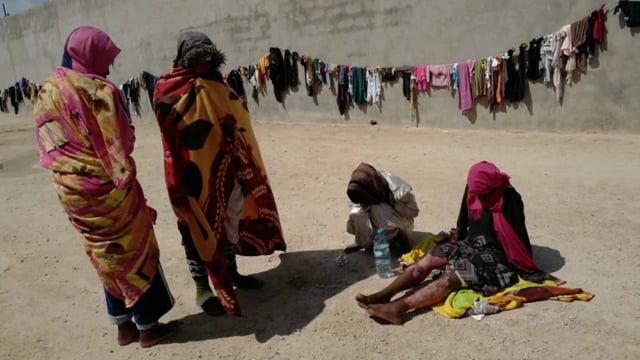
Sorman women's detention centre
For the past year, Médecins Sans Frontières has been providing lifesaving and primary healthcare to refugees, asylum-seekers and migrants detained in Tripoli. If security conditions allow and if it is considered safe to do so, medical teams visit seven different detention centres nominally under the control of the Ministry of Interior on a weekly basis. Since activities started in June 2016, teams have visited a total of 16 detention centres. There are other detention centres that remain inaccessible for Médecins Sans Frontières teams due to ongoing violence and insecurity.
In Misrata, Médecins Sans Frontières is providing healthcare to refugees and migrants in held in four detention centres. Each month medical teams provide about 100 medical consultations and make around a dozen referrals to secondary and tertiary healthcare facilities so that detainees in need can receive further medical assistance. MSF recently opened mobile clinics in Misrata and further south to provide medical and humanitarian assistance to migrants and refugees outside official detention centres.
Médecins Sans Frontières has worked in Libya since 2011 to support the health system, which has been impacted by the renewed war and the ensuing economic recession. To help public health structures which struggle with shortages of medicines and staff, Médecins Sans Frontières continues to respond with donations and other support. Responding to the needs of communities affected by the conflict, Médecins Sans Frontières is also providing paediatric, gynaecological and obstetric care, as well as mental health services, in Benghazi.



